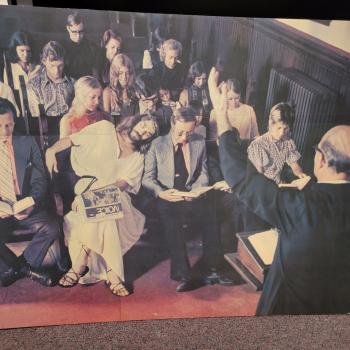Through out this long study of Paul, there have been certain texts that are the linchpins for Tom’s whole approach to the matter. Rom. 2.28-29 is one such text, but that text is part of the larger discussion in 2.17-29 where quite specifically the Jew is being addressed, not the follower of Christ, and he is being shamed by the tactic of point out how some Gentiles, who are not circumcised, do a better job of actually keeping various aspects of the Law. This is not about Christians, it is about genuinely keeping the Mosaic Law, and Paul’s whole point as the passage climaxes is that things like circumcision really don’t count for much unless one also keeps the Law from one’s heart. The contrast is between outer and inner, and Paul would have been the last person to suggest that no one had been a genuine Jew, prior to the time of Jesus. The text reads literally “for not in the open (public) Jew is, nor those in the open in the flesh circumcised, but those in the secret Jew and circumcision of the heart in the Spirit not the letter, who the praise not from humans but from God.” Needless to say this passage is cryptic and much debated— what ought not to be debated is that the contrast here is between what is public and visible from the outside of a person, and what is secret and hidden on the inside of the person. We must go back to vs. 17 to make sense of things where we are told that Paul is talking about people who ‘call themselves Jews’ something that no normal pagan in their right minds in the first century would do, unless somehow they had become a convert to Judaism. ‘Jew’ in vs. 17 does not refer to Christian, nor does it do so latter in this particular argument. It is possible to argue that by the end of the passage Paul is suggesting that Jews like himself, Jewish Christians, who have undergone circumcision of the heart are in view. What is not possible is to argue that Paul means in Rom. 2.28-29 Jews and Gentiles who now may all merrily be called Jews, co-opting the normal universal meaning of that term in the first century A.D., including in Rome. Paul then would be speaking as a Jew to Jews, and making the case that they needed to become like him, circumcised in the heart by the Spirit. This case makes sense, and it works. What doesn’t work is arguing that sometimes Paul means Christians by the term Jews, and the church by the term Israel. I agree with Tom that there may be an allusion in Rom. 2.28-29 to the Jeremiah promise about the law written on the heart in regard to the new covenant. This too is possible. But again, it would be a new and new kind of covenant we would be talking about, not the Mosaic one inaugurated by literal circumcision. On the other hand, Paul may simply be talking about sincere Jews like himself who were ‘blameless’ (see Phil. 4) when it came to observing the Law and Jewish praxis. His point then would be the same as the point Jesus made about hypocrites who are outwardly pious but inwardly not.
Tom on p. 1444 quotes Ed Sanders to the effect that Paul saw the church as a third entity (neither Israel, nor some pagan community, but a community of Jew and Gentile united in Christ). The quotes ends with Sander’s remark that in important ways this new community was neither Jewish nor Greek. I think he is right about this, but Tom objects to such a statement based on his reading of Rom. 2.29. I do think however, especially today where the term ‘race’ has so many emotively charged senses, that we should not talk about Paul advocating a third race of human beings, neither Jew nor Gentile. A new community, yes. A new race no. But it is true to say that Paul believes there is a new humanity in general in Christ. That is surely what 2 Cor. 5.21 is about. And so let’s drop the term ‘third’ from the discussion, even though later Christian apologists found it useful (Clement Strom.6.5.41.6;Aristides, Apol. 2.2, actually the latter speaks of a fourth race after Jews, Greeks, and barbarians). Paul is talking about a whole new humanity in Christ that involves both Jews and Gentiles, but is this community is in various ways neither Jewish nor Gentile. There is enough discontinuity with both such communities to make this clear. A little note on 1 Pet. 2.9 will not go amiss here. Is Peter saying Gentiles and Jews are now this royal priesthood? That of course depends on who Peter’s audience or main audience is in 1 Peter, and I would say it is Hellenized Diaspora Jewish Christians, not Gentiles (see my Letters and Homilies for Jewish Christians).
Tom is right however to insist that passages like 1 Cor.10.31-11.1 do distinguish Jews, Greeks and the church of God as three entities, and Gal. 6 does indeed say circumcision nor uncircumcision matters, what matters is the new creation. Again, there is only one people of God at any one time in history, and so Paul is happy to say that Jewish Christians and those Gentiles united to them are heirs of Abraham, and of the promises made to him, and indeed become beneficiaries of the heritage of Israel.
BUT as Paul will continue to say, Jews are still Jews, and Greeks are still Greeks and Israel and the church are not the same thing. It would in any case be a truly weird thing for the apostle to the Gentiles to say to largely Gentile audiences ‘ya’ll are all Jews, Israelites now’. They would have been more likely to nod if he had said, ‘we should all call ourselves Greeks now’, not least because Paul had left behind being Torah true as a requirement for his life! But Paul says neither. He remains a Jew, but his primary identity is in Christ. Likewise, Gentiles remain Gentiles, but their primary identity now is in Christ— that third entity, that third community. Here Margaret Mitchell, as so often, is right on target on this issue in her Paul and the Rhetoric of Reconciliation.
Tom’s argument for the third identity, and third community is for the most part right on target. Though on p. 1449 he wants to suggest that becoming part of that new community, while it involved a new creation for Gentiles, it merely involved a resurrection for Jews. This hardly comports with Paul’s direct statement in 2 Cor. 5.21 that ‘in anyone is in Christ…’ including presumably himself, there is a new creature, a saying, I might add that probably reflects knowledge of the Jesus tradition in which he told Nicodemus, a sincere, devout, Jewish teacher, that even he ‘must be born again’. Just so. Everyone enters the new community through the new birth, through becoming a new creature in Christ.
The final main section of this long chapter deals with the issue of Paul’s use of Scripture. Here Tom echoes the ‘echoes’ of Richard Hays and his offspring in arguing that Paul often alludes to whole large swaths of the OT when he gives a citation and he assumes at least some in his audience will know the larger context. This is as opposed to Chris Stanley’s view which is said to be as follows: “Paul’s audiences, being supposedly largely Gentile, and not well educated ones at that, would have been unlikely to pick up what we may think we discern as biblical echoes. This means we must assume Paul’s purpose in quoting Scripture to be quite different form the sophisticated and often quite subtle intertextual meanings proposed by Hays. Instead, we should conclude that his quotations were mainly for rhetorical effect, demonstrating to his audience that he knew ancient texts, which, so he claimed, supported his position. In a world where such an appeal might carry weight, that is all, for the most part, that we should suppose Paul to be doing. (p. 1451, based on Stanley 2004, p.135).
I think this critique has some merit, though not as much as Stanley thinks. Paul does sometimes allude to and echo larger portions of Scripture in his citations and in the larger contexts of his citations. But this is not the only way he uses Scripture. Sometimes, like with the famous muzzled ox passage in 1 Cor. Paul is not really doing that. He is simply making homiletical use of a passage about a literal ox, rather than doing contextual exegesis or application of the original passage. His point is seen in the ‘if even the ox……’ comment. Tom is of course right to respond that sometimes authors do say more than their audience is currently competent to comprehend, but Paul would have assumed these letters would be read more than once in the congregation, to which I would add, even if you have only a few OT knowledgable folks in the audience, they could help the rest to understand, and even more to the point, these letters were probably delivered by OT competent readers like Phoebe or Timothy or Titus. So they could help the audience with allusions. But having said that, there is the danger in the Hays approach of over-reading the OT context into what Paul is trying to achieve when he cites this or that passage. For example, I do think that Rom. 9-11 with its plethora of citations is in part simply intended to bring the largely Gentile audience down a peg or two, not to give detailed contextual exegesis of all the passages cited or alluded to. The rhetorical effect is— ‘there is much you don’t know’. So I think it is a yes and a no to both the Hays etc. approach and to the Stanley etc. approach. Paul’s use of the OT is very varied!!
On p. 1453, Tom makes the valuable point that one’s view of how Paul uses Scripture is inter-related to one’s view of how he viewed and related to Israel (and I would add, its future). I agree as well that Paul’s use of the OT reflects his understanding of the larger narrative of salvation history. True enough. Paul doesn’t just proof text the OT. He has a grand narrative in mind from creation to new creation, from Adam to last Adam, from Abraham to the fulfillment of that covenant’s promises in Christ, and beyond.
I find the comment on p. 1455 odd— that we should see the question of Paul and Scripture as one subset of the question of Paul and the Law. I would say just the reverse. Scripture is bigger than Torah or Pentateuch or Mosaic covenant. No indeed, we should see Paul and the Law as simply one subset story under the larger banner of Paul and Scripture. Then we’ve put the emphasis in the right place.
Beginning on p. 1456 and continuing pretty much to the end of the chapter we have an interesting interchange between Tom and Francis Watson’s important book Paul and the Hermeneutics of Fath. It is interesting not least because they both agree that Paul is no soundbyte man when it comes to the use of the OT. Rather he has a deep, profound, and extensive grasp of the OT text. Watson,like Wright, sees Paul as a intelligent and sensitive reader of the OT. So far so good. But as quickly becomes apparent, they strongly disagree in various ways about Paul’s interpretation of the OT, and his use thereof. Wright seems closer to Hays, Watson, closer to traditional Reformed readings of Paul and righteousness by faith.
Tom commends Watson for doing an excellent job of reading Paul in relationship to other second Temple Jewish handlings of the OT for instance in Wisdom of Solomon, Philo, Jubilees, Josephus, Baruch etc.
Tom sees as one of the major thrusts of Watson the view that he believes Paul thinks there are two voices in the Torah (i.e. Pentateuch), two major tensions— between the unconditional promise and the Sinai legislation, and between the Law’s offer of life and it’s curse. Watson sees these tensions as between Genesis and Exodus, and between Leviticus and Deuteronomy. He says further that there is a distinction between laying all emphasis on the promise to Abraham leading to unconditional divine saving activity and a reading centering on the demand which emanates from Sinai for specific forms of human action and abstentions. He goes further to say that Paul discerns an optomistic and a pessimistic voice in the text, the former suggesting that the commandments could and should be obeyed, the latter assuming such efforts are doomed to failure. Thus (see p. 1457) he speaks of a deep faultline in Scripture itself, an inner Scriptural antithesis. Tom by contrast sees this tension resolved in Christ, and in particular in his death. I would say the latter view is more nearly right, but Watson has a point about the Abrahamic promises vs. the Sinai demands. It is strange then that he fails to follow Paul who says that this is all explained as a tale of two covenants— the Abrahamic one and the Mosaic one (see Gal. 3-4).
The discussion moves on to a detailed interaction with Watson’s own detailed proposals about Habbakuk 2.4 and its use for example in Romans 1. Watson, taking a surprisingly traditional line, suggests Paul is really talking about humans being righteous by means of faith. Tom thinks of course that Paul is talking about God’s righteousness as a cipher for his covenant faithfulness. In various respects they are both wrong. Tom is right that ‘the righteousness of God’ is about God’s own righteousness in Rom. 1.16-17. That however is not a cipher for covenant faithfulness, either in Habbakuk or in Romans.
On p. 1459, Tom laments that Watson is focusing far too much on Scripture as normative, and not nearly enough on Scripture as narrative. But these two things should not be set in antithesis to one another. For Paul Scripture is indeed the living word of God just as applicable to his Gentile converts as to Jews, whether Christian or not. Interestingly, (p. 1460) Tom objects to Watson’s saying that the OT talks about a second chance, which Tom insists be called covenant renewal. Here, I think Watson is more nearly right, especially when it comes to Paul. Paul does have a second chance theology vis a vis the future of Israel. And furthermore, Paul does not think God owes Gentiles anything, no covenant renewal or faithfulness required in regard to them. I would stress that the tension between the Abrahamic promise and the Sinai covenant which can only lead to curse sanctions since it was not kept at all adequately, is found in the covenant theology which says the Mosaic covenant was pro tempore, for a period of time, and was not renewed. Deut. 27-32 may lead to exile, but it does not lead back again because the covenant renewal depended on things like turning back to God, or embracing the star prophecy or, or, or. These things Paul says did not happen. The new covenant is not about a renewal of what is referred to at the end of Deuteronomy, which was inevitably the renewal of the Sinai covenant, which Paul says is obsolete! (see 2 Cor. 3-4 and Gal. 4). What happened in Christ’s death is the absorbing of the curse sanctions of the Mosaic covenant, and thereby ending it, and the new ‘second chance’ which Watson speaks of being inaugurated. Some of the particulars matter. For example, Rom. 9.31, true enough, says not that Israel did not attain righteousness because she pursued it by law, but that Israel did not attain the law because she pursued it by works. But surely by the latter Paul means works of the Mosaic law, which Israel pursued. So to say Israel did not attain to righteousness (the goal of the law along with holiness) because she pursued it by works of the Law is to say the same thing as Israel did not attain to (the function, purpose, goal) of the law because she pursued it by works (of the law). Watson is more nearly right that Paul is trying to move beyond the conditional logic (and conditional covenant!) that involves blessing and curse, to the unconditional basis of divine saving action.
As for Hab. 2.4– in Romans it reads literally ‘the righteous out of faith shall live’, and of course we can ask what does from or out of faith modify– righteous, or live. Watson sees this as meaning the one who is righteous by means of faith shall live. The original text of Hab. 2.4 however may suggest something else. It could be read to say ‘The righteous one (just possibly a reference to the messiah?) shall live by my faithfulness (which in this case would be Yahweh’s faithfulness). If the latter is meant, it favors Tom’s reading of the term faith, but in Romans the word faith is not modified by ‘my’. As Tom points out on p. 1468, the LXX has from my faith/faithfulness. I agree with Tom that Paul does not mean by the phrase ‘the righteousness of God’ the right-standing of humans granted by God. Tom is right that if that is what he meant Hab. 2.4 was the wrong proof text especially in the Greek Bible. Sadly, there is no discussion of Gal. 3.11 where there is a clear contrast between living by law and living by faith, but Tom seems to promise a future commentary on Galatians, or at least that key verse.
Tom’s conclusion is worth quoting:Paul is “A Jew like no other. Yes perhaps. An anomalous Jew, from one point of view, yes. A renegade Jew? Not if you believe Jesus was Israel’s Messiah. An Israelite indeed– though with enough rhetorical guile to harangue the Galatians one minute, tease the Corinthians the next, and set before the Romans a text like no other…Paul insisted that his primary self definition was not,in fact, simply that of being Jewish. His primary self-understanding was that he was a Messiah man. He was en Christo and conversely the Messiah lived in him.” (p. 1471). This is right on target. And it leads finally to the final chapter…

















